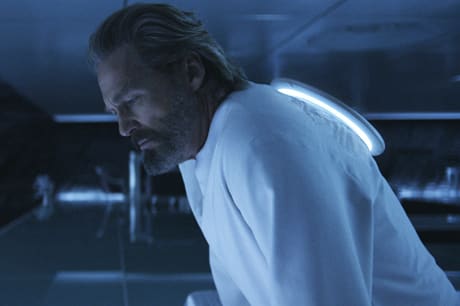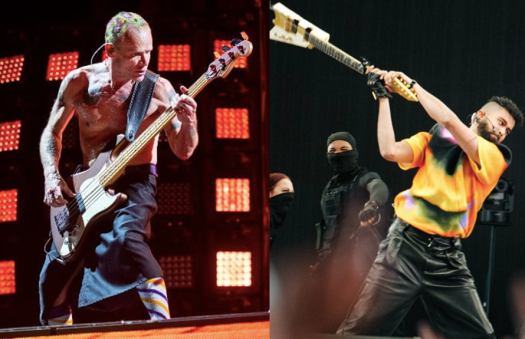Given the task of updating Tron ― a film hailed for its groundbreaking special effects and impact on internet and gaming culture nearly 30 years ago ― first-time director Joseph Kosinski has instead essentially rebooted the system.
Sam Flynn (Garrett Hedlund) grew up without his father, Kevin (Jeff Bridges), because the elder Flynn entered the conceptualized computer world nearly 30 years ago and never came back. (The time, from 1982's original Tron to Hedlund being in his late 20s, doesn't work; it's not the only contradiction in the film.) Now that Flynn Jr. is the largest shareholder in the world's biggest computer company, he wants only to drive dad's vintage bike, play annual hacking pranks on the corporation and pine for his lost childhood.
When he and his father's old business partner (Bruce Boxleitner, reprising his original role) get called back to the still-standing Flynn's Arcade, Sam gets sucked into the Grid, where "programs" are seemingly sentient and at war with their human "users." Flynn immediately gets the Tron treatment: suited up in fluorescent gear and sent to battle in the "games" ― basically deadly Frisbee and light cycle racing.
The great achievement of Tron: Legacy starts immediately ― adhering to the simple, original design sensibilities (darkness intended to hide effects flaws, red-and-blue colour schemes to keep good and evil straight), this is a techno update of the original, not a bells-and-whistles redesign. The minimalist look, foreboding permanent midnight and glow of machine and avatar alike are effectively updated without diminishing their original power. Combined with a seat-rattling soundtrack by Daft Punk (who make an appropriate cameo in a nightclub scene), the look and sound of Tron: Legacy is a spectacular tribute to the original.
The story, on the other hand, is largely cribbed from the original. Sam is initally taken prisoner by Clu ― the computer program that daddy designed in his image then put in charge of the Grid, with marching orders to make it a "perfect" system. (Clu and his Bruce Boxleitner avatar counterpart, Tron, are both digitally manipulated to resemble the actors' 1982 selves, which is fairly creepy.) Meanwhile, Kevin Flynn ― trapped in the Grid since his portal back to the real world closed ― is living like the last techno hippie (oh, Jeff Bridges), referring to digital/human evolution as "bio-jazz" and exclaiming "radical" when impressed. The Flynns, father and son, are trying to get out of the Grid through the portal Sam's arrival created, taking Quorra (Olivia Wilde), the next stage of digital life, with them before Clu eliminates them all as "imperfections" in his system.
There's plenty of under-explained mishegoss throughout the film ― like how the Grid's "programs" are sentient and aware enough to demand gladiatorial games, yet the evolution of digital life is a threat, or how Kevin Flynn lives inside a digital sphere yet eats, sleeps and ages ― but Legacy handles them as the original did: say nothing. By offering no explanation beyond the cursory, the construction of the answer can't be picked apart.
It's better to be entertained by Michael Sheen tripping the light fantastic as a nightclub host than question how the Grid even exists in relative time and space. Tron: Legacy gives plenty of eye candy to distract you on the journey.
(Buena Vista)Sam Flynn (Garrett Hedlund) grew up without his father, Kevin (Jeff Bridges), because the elder Flynn entered the conceptualized computer world nearly 30 years ago and never came back. (The time, from 1982's original Tron to Hedlund being in his late 20s, doesn't work; it's not the only contradiction in the film.) Now that Flynn Jr. is the largest shareholder in the world's biggest computer company, he wants only to drive dad's vintage bike, play annual hacking pranks on the corporation and pine for his lost childhood.
When he and his father's old business partner (Bruce Boxleitner, reprising his original role) get called back to the still-standing Flynn's Arcade, Sam gets sucked into the Grid, where "programs" are seemingly sentient and at war with their human "users." Flynn immediately gets the Tron treatment: suited up in fluorescent gear and sent to battle in the "games" ― basically deadly Frisbee and light cycle racing.
The great achievement of Tron: Legacy starts immediately ― adhering to the simple, original design sensibilities (darkness intended to hide effects flaws, red-and-blue colour schemes to keep good and evil straight), this is a techno update of the original, not a bells-and-whistles redesign. The minimalist look, foreboding permanent midnight and glow of machine and avatar alike are effectively updated without diminishing their original power. Combined with a seat-rattling soundtrack by Daft Punk (who make an appropriate cameo in a nightclub scene), the look and sound of Tron: Legacy is a spectacular tribute to the original.
The story, on the other hand, is largely cribbed from the original. Sam is initally taken prisoner by Clu ― the computer program that daddy designed in his image then put in charge of the Grid, with marching orders to make it a "perfect" system. (Clu and his Bruce Boxleitner avatar counterpart, Tron, are both digitally manipulated to resemble the actors' 1982 selves, which is fairly creepy.) Meanwhile, Kevin Flynn ― trapped in the Grid since his portal back to the real world closed ― is living like the last techno hippie (oh, Jeff Bridges), referring to digital/human evolution as "bio-jazz" and exclaiming "radical" when impressed. The Flynns, father and son, are trying to get out of the Grid through the portal Sam's arrival created, taking Quorra (Olivia Wilde), the next stage of digital life, with them before Clu eliminates them all as "imperfections" in his system.
There's plenty of under-explained mishegoss throughout the film ― like how the Grid's "programs" are sentient and aware enough to demand gladiatorial games, yet the evolution of digital life is a threat, or how Kevin Flynn lives inside a digital sphere yet eats, sleeps and ages ― but Legacy handles them as the original did: say nothing. By offering no explanation beyond the cursory, the construction of the answer can't be picked apart.
It's better to be entertained by Michael Sheen tripping the light fantastic as a nightclub host than question how the Grid even exists in relative time and space. Tron: Legacy gives plenty of eye candy to distract you on the journey.




